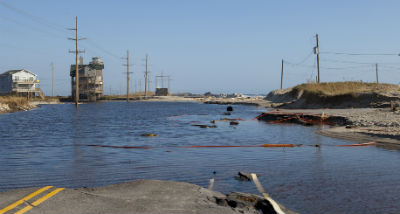RALEIGH — The N.C. General Assembly got down to business in its first full week of the short session with the state Senate pushing through key environmental bills, including a sweeping 62-page set of regulatory changes that would limit people’s ability to challenge air and coastal development permits, virtually eliminate state protection of certain wetlands and allow the governor to bypass environmental safeguards in rebuilding coastal roads during an emergency.
The Regulatory Reform Act of 2014, which covers everything from handicapped parking fines to beer sales at community colleges,easily passed the Senate Thursday, 34-12, setting up a final vote next week after which it would head to the N.C. House.
Supporter Spotlight
Here’s a summary of the major environmental measures contained in the bill that will affect the coast.
Air Quality
Changes in the bill will make it much more difficult for people to challenge state air-quality permits. They would first have to prove that the emissions would violate air-quality standards. Rather than suspending permits during a challenge, as is done now, the bill allows them to move forward.
 Molly Diggins |
 Goeff Gisler |
Molly Diggins, director of the N.C. chapter of the Sierra Club, said the changes would effectively prevent environmental groups and others from challenging permits issued to heavy industries, like Titan America. The company wants to build a controversial cement plant near Wilmington. It received a state air permit, but a coalition of groups, including the N.C. Coastal Federation, challenged the permit, claiming the company wasn’t reducing emissions to the levels required by federal law.
“The challenge to Titan could not have gone forward under this provision,” Diggins said.
Mike Giles, a coastal advocate for the federation, said the provision flies in the face of what’s reasonable. “It makes it virtually impossible to defend the quality of the air we breathe when the state fails to do so on our behalf,” he said.
Supporter Spotlight
Geoff Gisler, an attorney with the Southern Environmental Law Center, said the proposed change would force people to spend thousands of dollars on sophisticated and expensive scientific analysis before filing a challenge. The law center is representing the groups challenging the Titan permit.
Gisler’s colleague at the law center, Brooks Rainey Pearson, was particularly troubled by the provision that allows a permit to remain active during the challenge because judges would be less likely to stop an ongoing project.
Limiting people’s ability to challenge state decisions runs counter to the intent of the federal Clean Air Act on which the state program rests. That law, said Pearson, guarantees the right of people to challenge permits.
“I am not sure the EPA is going to go for this if there is a de-facto ban on citizen groups,” she said.
Another section of the regulations bill would require the state Department of Environment and Natural Resources, or DENR, to remove by Sept.1 all air-quality monitors not required by federal law. That could amount to about half of the 170 monitors in the state.
Nadia Luhr, legislative counsel for the N.C. Conservation Network, noted in a written analysis of the bill: “Ambient air monitors are important tools for monitoring air pollution and reporting the level of pollutants present in areas of concern. Removing all ambient air monitors not required by federal law will only decrease the amount of information the state will have available to protect citizens from unhealthy levels of air pollution.”
CAMA Permits
Another provision in the regulations bill could make it harder for people to contest permits issued under the Coastal Area Management Act. If someone now wants to contest such a permit, he has to convince the chairman of the Coastal Resources Commission that the challenge has merit. The case would then be heard by an administrative law judge. The entire commission would have to approve the challenge under the bill.
The permit would remain in effect while the challenge is being decided. Contested permits are now suspended until a decision is reached.
Isolated Wetlands
The bill would greatly loosen state protection of small tracts of wetlands that aren’t directly connected to a waterway. These so-called “isolated” wetlands aren’t protected by federal law. The state currently requires a permit for any development activity in isolated wetlands that are larger than a third of an acre east of Interstate 95 and a tenth of an acres west of the highway. The new law lowers that threshold to an acre anywhere in the state.
According to a DENR database of isolated wetland permits issued since 2008, none of the projects in the coastal plain were larger than an acre. All would have been exempt from permitting under the proposed new threshold. Ninety-seven percent of the permitted projects across the state would not need permits under the proposal.
In Case of an Emergency . . .
 The Senate bill would give broad powers to the governor to waive environmental reviews and safeguards to rebuild coastal roads and bridges after a declared emergency. Photo: FEMA |
In the event of a declared emergency, a provision in the bill would allow Gov. Pat McCrory and the state Department of Transportation to bypass required environmental permits for the “repair, protection, safety enhancement, or replacement of a component of the State highway system that provides the sole road access to an incorporated municipality or an unincorporated inhabited area bordering the Atlantic Ocean or any coastal sound . . .”
The bill spells out what’s meant by replacement which “shall not be interpreted to exclude a replacement that increases size or capacity or that is located in a different location than the component that is replaced.”
Pearson said the language appears aimed at Bonner Bridge and is under review by a legal team to see how it would affect her group’s lawsuit against the state over the new bridge design.
“This gives the DOT the authority to do whatever it wants,” she said.
Pearson said the provision appears to give the governor a way around sedimentation, erosion, wildlife and water quality rules, but given the number of federal agencies involved it may not be possible for McCrory to do what the new law says he could.
“Those laws are there for a reason,” she said.
Local Governments
Local governments win and lose under the bill. It lifts restrictions adopted last year against local environmental legislation, but ends all local regulations on fertilizer, moving sole regulatory authority over their use, labeling storage and application to the N.C. Department of Agriculture and Consumer Services. The bill also requires DENR to identify and to report to the legislature on local ordinances that “impinge on or interfere with” any area it regulates.
Hush
 Local governments could no longer pass ordinances about the fertilizers. |
One piece of the bill that has worried environmental advocates mirrors legislation in other states sponsored by the American Legislative Exchange Council, a corporate funded non-profit that writes “model” legislation for state politicians. The provision would allow companies to keep results of internal environmental audits secret even from regulators after a major event. The audits also would not be subject to discovery in legal challenges.
That gives companies “a free pass” to keep the public and regulators in the dark about the extent of a problem, how long it had gone on and what the audit found, Diggins said. “It says we have to take the polluter’s word on it,” she said.
Oyster Sanctuary
The bill directs the N.C. Division of Marine Fisheries and DENR to recommend an area of about 10,000 acres in Pamlico Sound to the Environmental Review Commission for the “Senator Jean Preston Marine Shellfish Sanctuary” and to create a plan for its management.
Preston was a longtime state senator from Carteret County. She died last year.
Other Bills Moving
The emergency powers in the Senate regulation bill are also included in another bill introduced last week by Sen. Bill Cook, R-Beaufort, which would allocate $15 million toward the establishment of a state park around Oregon Inlet.
Cook announced the plan this week saying the Army Corps of Engineers had not lived up to their promise to keep the inlet open.
“Under their control the inlet has been unnavigable and dangerous,” Senator Bill Cook (R-District 1) said. “The time has come to reclaim the land around Oregon Inlet to properly develop and manage it.”
The bill builds on the work of the Oregon Inlet Land Acquisition Task Force, which recently studied the potential purchase for land swap with the U.S. Department of Interior for the inlet and surrounding lands.
“I have consulted with Senate leadership on the Oregon Inlet bill and they are in support of this initiative,” Cook told Coastal Review Online. “However, I would refer any additional questions to the Senate leadership and Governor on where they stand.”
Sen. Harry Brown, R-Onslow, the Senate majority leader, and McCrory’s office didn’t return telephone calls.
McCrory included $500,000 in next year’s budget to implement some of the recommendations of the task force.
Also moving through the Senate was a large set of revisions to the state’s plans to permit hydraulic fracturing for natural gas. The new legislation speeds up the timeline, allowing DENR to issue permits as early as July, 2015. It keeps in place a ban on using injection wells for wastewater, a provision pushed by the state’s coastal delegation over concern for local aquifers.
The bill calls for a study by the DOT, DENR and the State Port Authority of the potential for a liquefied natural gas terminal at a state port.







